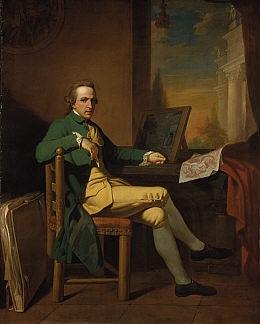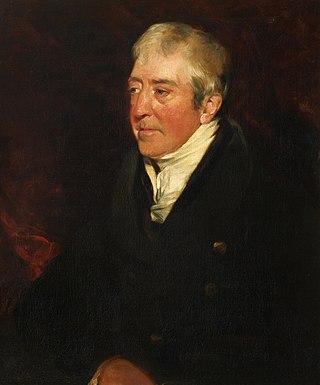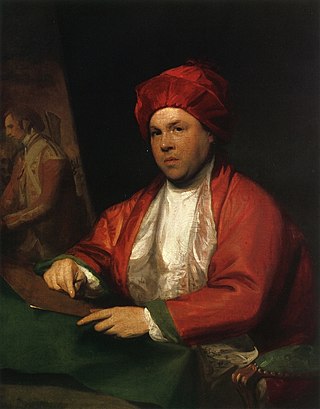
David Allan was a Scottish painter, limner, and illustrator, best known for historical subjects and genre works.

Sir Henry Raeburn was a Scottish portrait painter. He served as Portrait Painter to King George IV in Scotland.

Allan Ramsay was a prominent Scottish portrait-painter.

Allan Ramsay was a Scottish poet, playwright, publisher, librarian and impresario of early Enlightenment Edinburgh. Ramsay's influence extended to England, foreshadowing the reaction that followed the publication of Percy's Reliques. He was on close terms with the leading men of letters in Scotland and England. He corresponded with William Hamilton of Bangour, William Somervile, John Gay and Alexander Pope.

Alexander Nasmyth was a Scottish portrait and landscape painter, a pupil of Allan Ramsay. He also undertook several architectural commissions.

George Chalmers was a Scottish antiquarian and political writer.

Sir John Robert Steell was a Scottish sculptor. He modelled many of the leading figures of Scottish history and culture, and is best known for a number of sculptures displayed in Edinburgh, including the statue of Sir Walter Scott at the base of the Scott Monument.

William Woollett was an English engraver operating in the 18th century.

George Paul Chalmers was a Scottish landscape, marine, interior and portrait painter.

William Ramsay Maule, 1st Baron Panmure of Brechin and Navar was a Scottish landowner and politician.

Simon François Ravenet was a French engraver. In Britain he is usually termed Simon Francis Ravenet. He was one of William Hogarth's assistants.

The Canongate Kirkyard stands around Canongate Kirk on the Royal Mile in Edinburgh, Scotland. The churchyard was used for burials from the late 1680s until the mid-20th century.
James M. Burnet was a Scottish painter of rural scenes, based in the London area for most of his career.

Edward Francis Burney (1760–1848) was an English artist. His middle name is sometimes given as "Francisco" or "Francesco".
William Crawford ARSA (1822–1869) was a Scottish portrait and genre painter.

Edward Duncan was a British watercolourist known for his depictions of coastal views and shipping. He was a member of the Royal Watercolour Society and received Royal patronage from Queen Victoria.

Gainsborough Dupont was a British artist, the nephew and pupil of Thomas Gainsborough, R.A.

Scottish art in the eighteenth century is the body of visual art made in Scotland, by Scots, or about Scottish subjects, in the eighteenth century. This period saw development of professionalisation, with art academies were established in Edinburgh and Glasgow. Art was increasingly influenced by Neoclassicism, the Enlightenment and towards the end of the century by Romanticism, with Italy becoming a major centre of Scottish art.

Benjamin Smith (1754–1833) was a British engraver, printseller and publisher, active from 1786 to 1833. He was born c. 1754 in London. He worked mainly in dot or stipple engraving, producing portraits, illustrations, and allegorical and biblical subjects after prominent artists of the day.

John Bruce was a senior Scottish minister in the 19th century who held positions in the Church of Scotland and Free Church of Scotland.



















